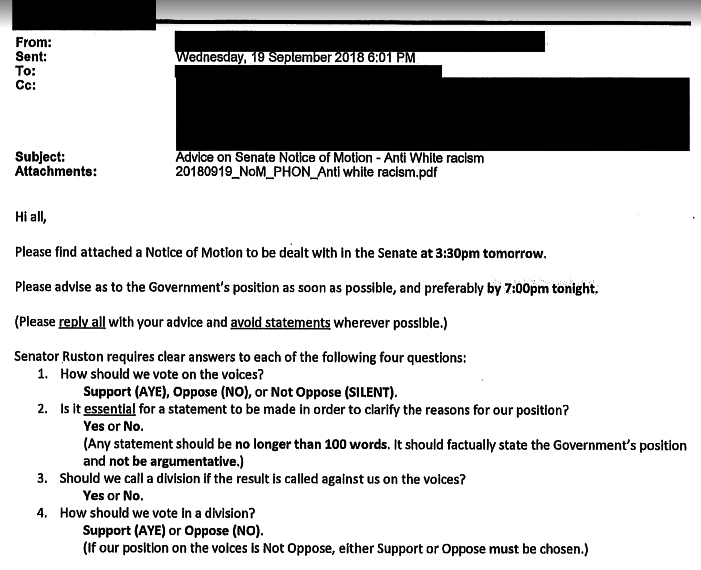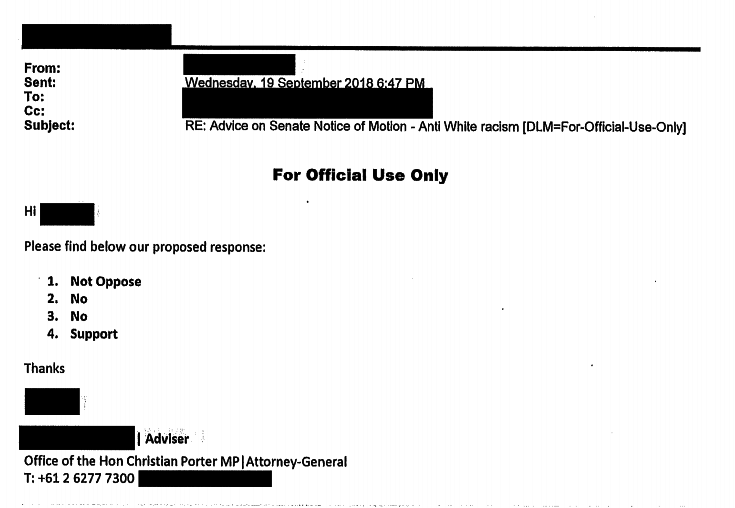
In October, the Senate narrowly voted down One Nation leader Pauline Hanson's motion – noting the "deplorable rise of anti-white racism and attacks on Western civilisation", and that "it is OK to be white" – 31 to 28.
The motion circulated to Senators.

The slogan "it is OK to be white" is used by the white supremacist and alt-right movements.
23 Liberal and National senators voted in favour of Hanson's motion, including communications minister Mitch Fifield, trade minister Simon Birmingham, Indigenous affairs minister Nigel Scullion, small business minister Michaelia Cash, deputy leader of the Nationals and minister for sport Bridget McKenzie, resources minister Matt Canavan, assistant minister for home affairs Linda Reynolds, assistant minister for treasury Zed Seselja, assistant minister for agriculture Richard Colbeck, and the assistant minister for international development Anne Ruston.
The following day, after the government faced significant backlash over the motion, finance minister Mathias Cormann said at a press conference that the government's intention had been to vote against the motion when it first came up in September. But when it was put forward again, in October, an "administrative error" in attorney-general Christian Porter's office meant that it "slipped through".

"When the motion was first put forward in September and we considered our position on the motion, we made a decision to oppose that motion and to make a statement in our own words that as a government we deplore racism of any kind, but not to actually support the motion," he said.
But emails obtained by BuzzFeed News under freedom of information law reveal Porter's office had directed Coalition senators to vote for the motion in September, and make no statement in regards to the motion.
This email from Sept. 19 is from communications minister Mitch Fifield's office seeking a position on the "It's OK To Be White" motion.

The response email said senators should not oppose the motion, should make no comment in parliament, and should support any division on the motion.

The Senate ultimately didn't get to vote on it in September. When the motion was again put up in October, Porter's office sent a near-identical email telling senators to not oppose the motion, not make a statement on it, and support the motion if a division was called.

The email, from a staffer – whose name has been redacted from the emails – said that Porter's office would be "happy to discuss this approach if needed".
The next day, Porter's office issued a statement clarifying it was an "administrative error" and had not been escalated to Porter personally because it was believed to be a statement opposing racism.
The motion was again brought back up in the Senate and was voted against on the voices – meaning no record of how each senator voted on the second motion is in Hansard. The first motion's voting record remains.
Cormann told BuzzFeed News that the government leadership in the Senate had decided in September to overrule the office of the attorney-general's advice, but this didn't happen in October.
"In September the Senate leadership team had formally decided to overrule the advice from the attorney-general’s office and to oppose that motion," he said. "That was the position we had formally adopted, and if the motion had been put to a vote then, Coalition senators would have voted against it."
The position wasn't maintained in October, he said.
“The error was subsequently corrected... We should have opposed it all the way through. That was always our intention and that is the position which is now appropriately reflected on the public record," Cormann said.
“We deplore racism of any kind. That is very clearly our position.”
BuzzFeed News has sought comment from the office of the attorney-general.
Changes to Senate rules in the last sitting fortnight will mean motions of this kind in the Senate will no longer be subject to lengthy debate in the chamber before being voted on.
